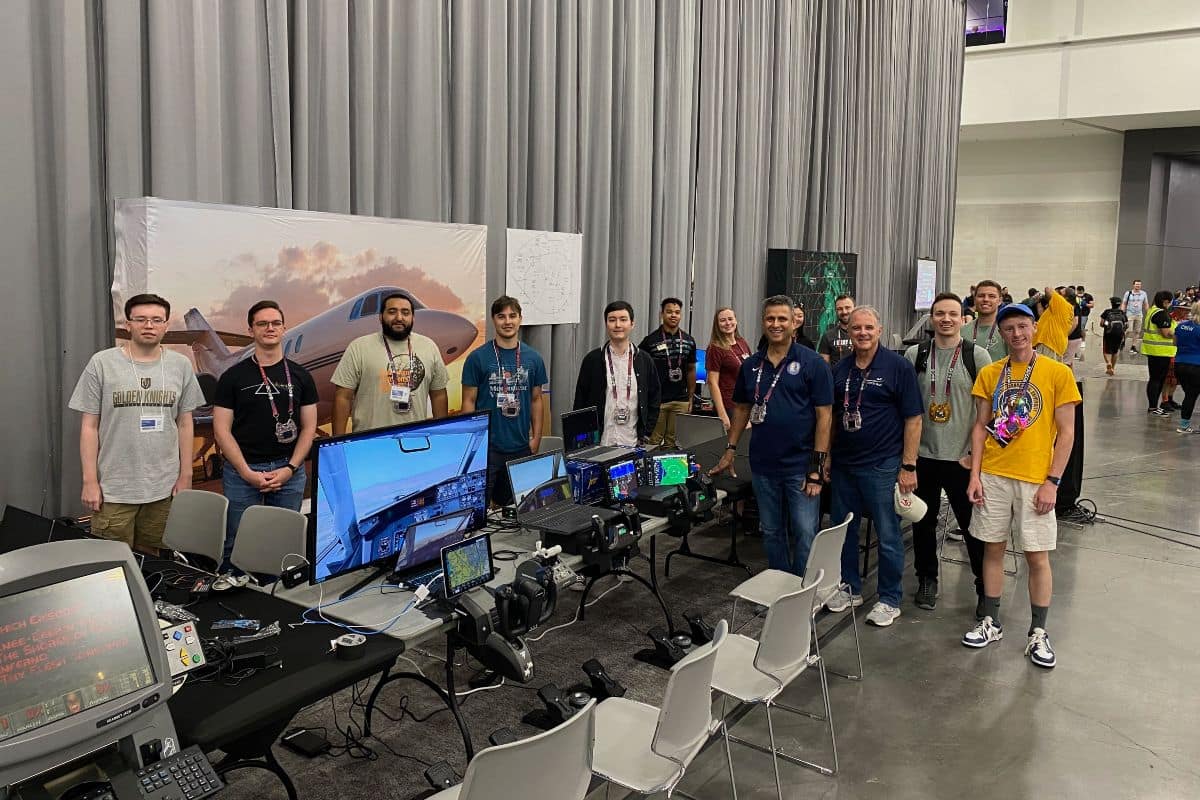Eagles Hone Cybersecurity Skills at Global Convention of Hackers

At the 2024 DEF CON cybersecurity conference, Embry-Riddle Aeronautical University senior Nathan Johnson found himself fascinated by the newest techniques in “social engineering,” a type of hacking that involves manipulating people to penetrate computer systems.
“They had some very skilled people, as well as an artificial intelligence model, making cold calls to businesses to trick people into giving out specific information,” said Johnson, who is pursuing a degree in Cyber Intelligence and Security.
Learning such techniques provides an eye to recognizing and mitigating them, said Johnson, one of 17 Embry-Riddle students from the Cyber Intelligence and Security (CIS) and Air Traffic Management (ATM) programs that attended the August event in Las Vegas.
The DEF CON hacker convention, which is organized into “villages” that focus on various cybersecurity topics, brought together some 40,000 attendees. At its different villages, the Embry-Riddle students networked with government and industry professionals, and attended workshops on the latest cybersecurity trends, including those related to engineering, aviation and aerospace.
“As the capabilities of technology evolve, the boundaries between industries will blur,” said Air Traffic Management Assistant Professor Kyle Wilkerson. The event “provides our students with new opportunities to collaborate with other industry professionals outside the traditional relationships we have historically known.”

Air Traffic Management senior Jennifer Hong (left) with fellow students Carol Martin, Joshua Sawyer and Christian Hardy at the DEF CON cybersecurity conference. (Photo: Embry-Riddle/Jennifer Hong)
Enhancing Aviation Cybersecurity
Johnson, who plans to pursue his master’s degree in Cyber Intelligence and Security this spring, said the conference provided unparalleled hands-on experiences and networking opportunities. He engaged with everyone from fellow students to the chief executive officer of Aviation ISAC, a consortium focused on sharing intelligence to create a more resilient air transport network.
“The best thing new students can do is not limit their learning to classes,” said Johnson, who is also a National Science Foundation (NSF) CyberCorps Scholarship for Service recipient.
Jennifer Hong, a senior studying Air Traffic Management, said that her DEF CON experience broadened her understanding of cybersecurity’s relevance to the air traffic control world.
“Understanding cybersecurity threats is crucial for protecting air traffic systems and facilities from potential breaches,” Hong said. “Whether we improve our systems or teach controllers what to do during cyberattacks, we need to find ways to mitigate the possibilities of attacks.”
Embry-Riddle’s Prescott Campus offers a comprehensive air traffic management curriculum and is a designated Federal Aviation Administration Air Traffic Collegiate Training Initiative (AT-CTI) school. Prescott’s Cyber Intelligence and Security program is recognized as a National Center of Academic Excellence in Cyber Defense Education (CDE), and Embry-Riddle has been awarded the NSF’s CyberCorps Scholarship for Service program in aviation and aerospace cybersecurity.
Collaborations spanning Embry-Riddle’s Cyber Intelligence & Security and Air Traffic Management programs have drawn interest from cyber leaders of government agencies involved in aviation safety, including the FAA and the Transportation Security Administration, said Dr. Krishna Sampigethaya, department chair of Cyber Intelligence and Security at the Prescott Campus.
“Interdisciplinary research is essential to building a robust foundation for aviation cybersecurity,” Dr. Sampigethaya added. “We are eager to deepen these collaborations and support our students in paving new career pathways within the global community.”
The team’s participation at DEF CON was funded by Aviation ISAC. Further support was provided by the Aerospace Village, a division of the conference comprising a diverse group of hackers, engineers, pilots and policy leaders interested in securing aviation and space operations. Under the auspices of the Aerospace Village, the team facilitated Embry-Riddle’s flagship Aviation Cyber Capture-the-Flag (CTF) competition.
“We were thrilled to see our students excel again at DEF CON Aerospace Village,” said Jesse Chiu, assistant professor of Cyber Intelligence and Security. “Their dedication to advancing aviation cybersecurity led to more valuable connections for Embry-Riddle.”

 Keaton S. Ziem
Keaton S. Ziem